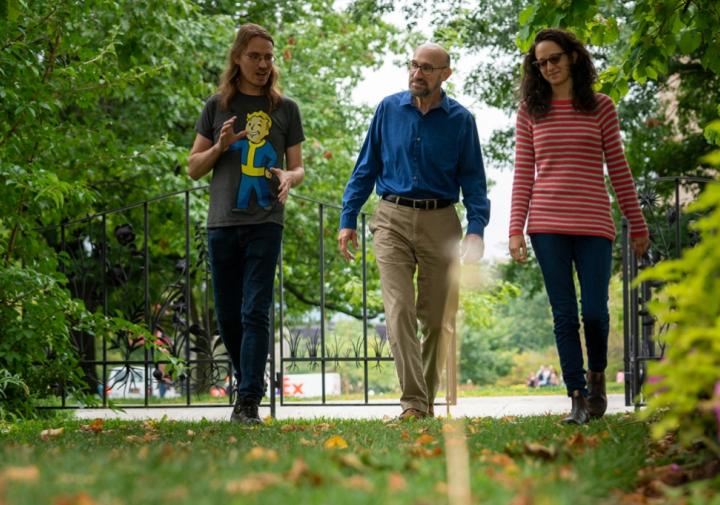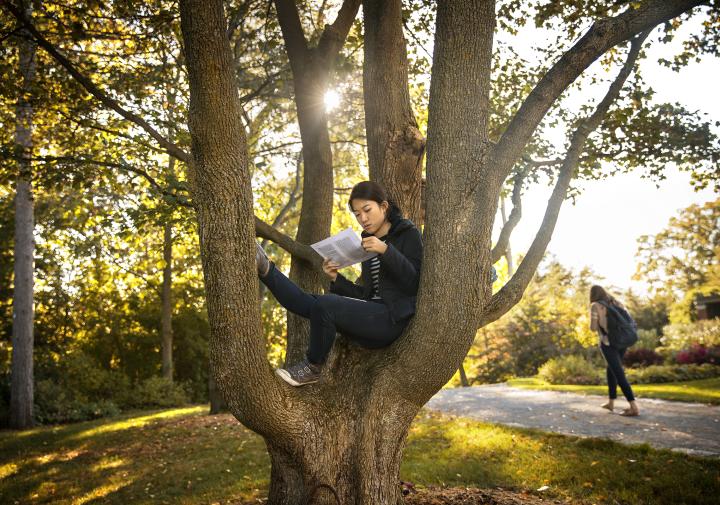Bad weather blues can get the best of anyone sometimes. The remedy: vitamin C, plenty of water and a dose of Nature Rx at least three times a week.
That’s the dosage no matter what the season suggested by the doctor – in this case Donald Rakow, associate professor in the Horticulture Section of the School of Integrative Plant Science at Cornell University.
Rakow is the innovator behind the Nature Rx program, formalizing what parents through the years have told their children: Get away from the video screens and go outside!
Lest you think nature is only found in remote national parks, a walk around the block or a visit to a city park are just as beneficial as a vacation to the Grand Canyon. “You don’t have to be in a primeval forest to be in nature and enjoy the benefits,” Rakow said.
Like many innovations, Nature Rx germinated from a casual coffee break conversation.
“Colleagues and I were discussing the beauty of Cornell’s campus and contrasting that against the degree of psychological problems that our students were manifesting,” Rakow said. “We arrived at the thought: couldn’t the beauty of the campus somehow better contribute to the mental and physical well-being of our student body? From that core idea in 2015, Nature Rx@Cornell has developed and grown.”
Use nature nearby
Nature Rx@Cornell works like this: Students who visit Cornell Health’s on-campus providers receive an electronic record of their visit, noting any prescriptions issued. In addition to the traditional recommendations, a check box states, “Nature Rx discussed and prescribed,” advising the student to spend more quality time in nature.
To help students fill that prescription, the Nature Rx@Cornell program developed a GPS-based website highlighting 17 natural and horticultural sites on or within walking distance of campus. The student-led Nature Rx Club organizes regular nature walks and similar activities to help their fellow students spend more time outside.


During the fall 2019 semester, Cornell health practitioners issued nearly 700 Nature Rx prescriptions, which were met with a positive student response. While Covid-19 closed the campus the following spring, several students indicated that they, along with others around the world, found emotional healing and safe space by spending time in nature. Back on campus, the program rebounded in fall 2021 and Rakow anticipates it will be operating at full force by spring 2022.
Nature Rx isn’t limited to the Cornell campus. The program has sprouted elsewhere, thanks in part to Rakow’s leadership helping to establish and co-directing the nationwide Campus Nature Rx Network. He is also working to bring Nature Rx to the Weill Cornell Medicine in New York City.
Take a hat, leave the cell phone
But students aren’t the only ones who can benefit from more time outside. “Spending time in nature helps anyone, no matter their age,” Rakow said.
Winter’s colder temperatures might make some shiver. But unless conditions are unsafe, grab a hat and gloves and get outdoors. In summer, prepare for the sun and bring water for a walk. “One of our other basic tenets is: There’s no bad weather, just inappropriate clothing,” he said.
In a world where many find it challenging to add basic exercise to already busy schedules, finding time can be an obstacle. But Rakow offered more guidance: “Studies show as little as 10 to 15 minutes two to three times per week can have a significant and positive impact on a number of psychological parameters.” And a brisk pace can add some cardio to your mental rejuvenation.
But a mindset shift is also in order.
“Many of the benefits of nature require awareness of nature,” he said. “We are an increasingly indoor-based, technologically focused species. So trying to get people to change their habits from spending all their time on video screens or phones to actually balancing that with time in nature is a big challenge.”
See also
Read more
Books by Don Rakow:
Rakow, Donald A., Meghan Z. Gough, and Sharon A. Lee. (2020). “Public Gardens and Livable Cities Partnerships Connecting People, Plants, and Place.” Cornell University Press, Ithaca, New York
Rakow, Donald A., and Gregory T. Eells (2019). “Nature Rx: Improving College-Student Mental Health.” Cornell University Press
Rakow, Donald A. and Sharon A. Lee. (2011). “Public Garden Management. A Complete Guide to the Planning and Administration of Botanical Gardens and Arboreta.” John Wiley & Sons Inc., Hoboken, New Jersey
Keep Exploring

News
- Animal Science
- Animals

News
- Cornell AgriTech
- School of Integrative Plant Science
- Plant Pathology and Plant-Microbe Biology Section

We openly share valuable knowledge.
Sign up for more insights, discoveries and solutions.


